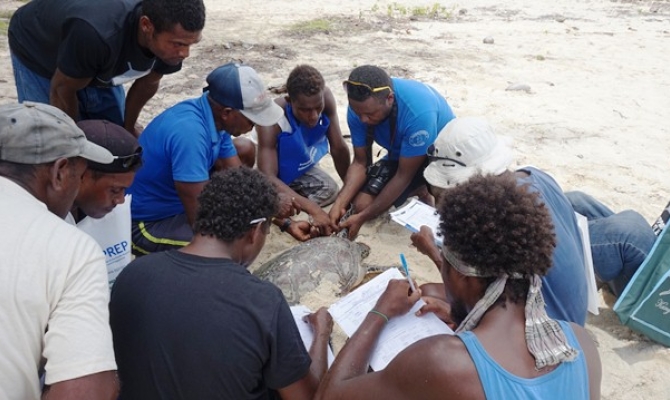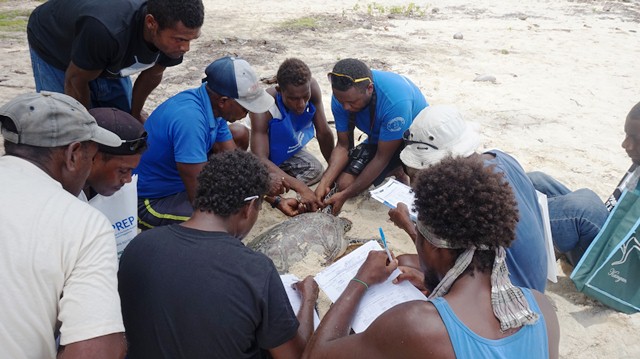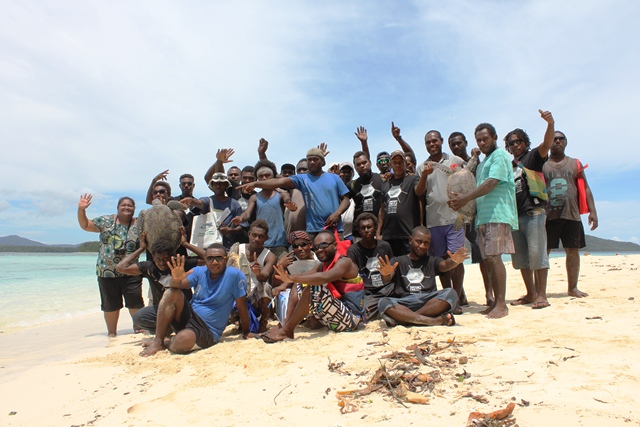
Island and Ocean Ecosystems
A community turtle monitoring training was conducted in Staghorn Conference room in Hautahe community in Marau Sound, East Guadalcanal coast in the Solomon Islands and hands on practical sessions were conducted on the beautiful Island of Kosa, one of the designated turtle nesting Islands for Marau community.
 Participants learning about turtle tagging
Participants learning about turtle tagging
The training was conducted by the Secretariat of the Pacific Regional Environmental Programme (SPREP) and Ministry of Environment, Conservation, Disaster Management and Meteorology (MECDM), Solomon Islands and was funded by the NZAID.
Thirty-one representatives from the three tribal groups in Marau who owned the designated turtle nesting islands of Kosa, Rauhi and Ta'aru and also other interested neighboring tribal groups were trained on how to monitor marine turtles during nesting seasons, carry out nest relocation when the nests are threatened by predators and the rising sea level, turtle flipper tagging and turtle species identification. The participants also learned important information about the life cycle of turtles, the migration routes, threats to turtle population and turtle policy.
 Catherine Siota, SPREP's Turtle Database Officer with participants from the Marau Training
Catherine Siota, SPREP's Turtle Database Officer with participants from the Marau Training
 Participants learning about turtle tagging
Participants learning about turtle taggingThe training was conducted by the Secretariat of the Pacific Regional Environmental Programme (SPREP) and Ministry of Environment, Conservation, Disaster Management and Meteorology (MECDM), Solomon Islands and was funded by the NZAID.
Thirty-one representatives from the three tribal groups in Marau who owned the designated turtle nesting islands of Kosa, Rauhi and Ta'aru and also other interested neighboring tribal groups were trained on how to monitor marine turtles during nesting seasons, carry out nest relocation when the nests are threatened by predators and the rising sea level, turtle flipper tagging and turtle species identification. The participants also learned important information about the life cycle of turtles, the migration routes, threats to turtle population and turtle policy.
 Catherine Siota, SPREP's Turtle Database Officer with participants from the Marau Training
Catherine Siota, SPREP's Turtle Database Officer with participants from the Marau TrainingDuring the turtle tagging practical when the turtles were tagged and released one of the turtle monitors, Mrs Audrey Risimora said, "This is the first time ever for me to see turtles being released freely back into the sea after they were being caught in Marau. This is an historical event for us, conserving turtles."
This training is part of the four year turtle monitoring and ecotourism development project which is funded by the New Zealand Aid programme and managed by New ZealandDepartment of Conservation and SPREP. The aim of the project is to enhance capacity and commitment in the Pacific Region to conserve and sustainably manage endangered marine turtle populations, and to achieve increased skills, sustainable economic benefits and improved livelihoods for local communities through turtle-related management and ecotourism activities.